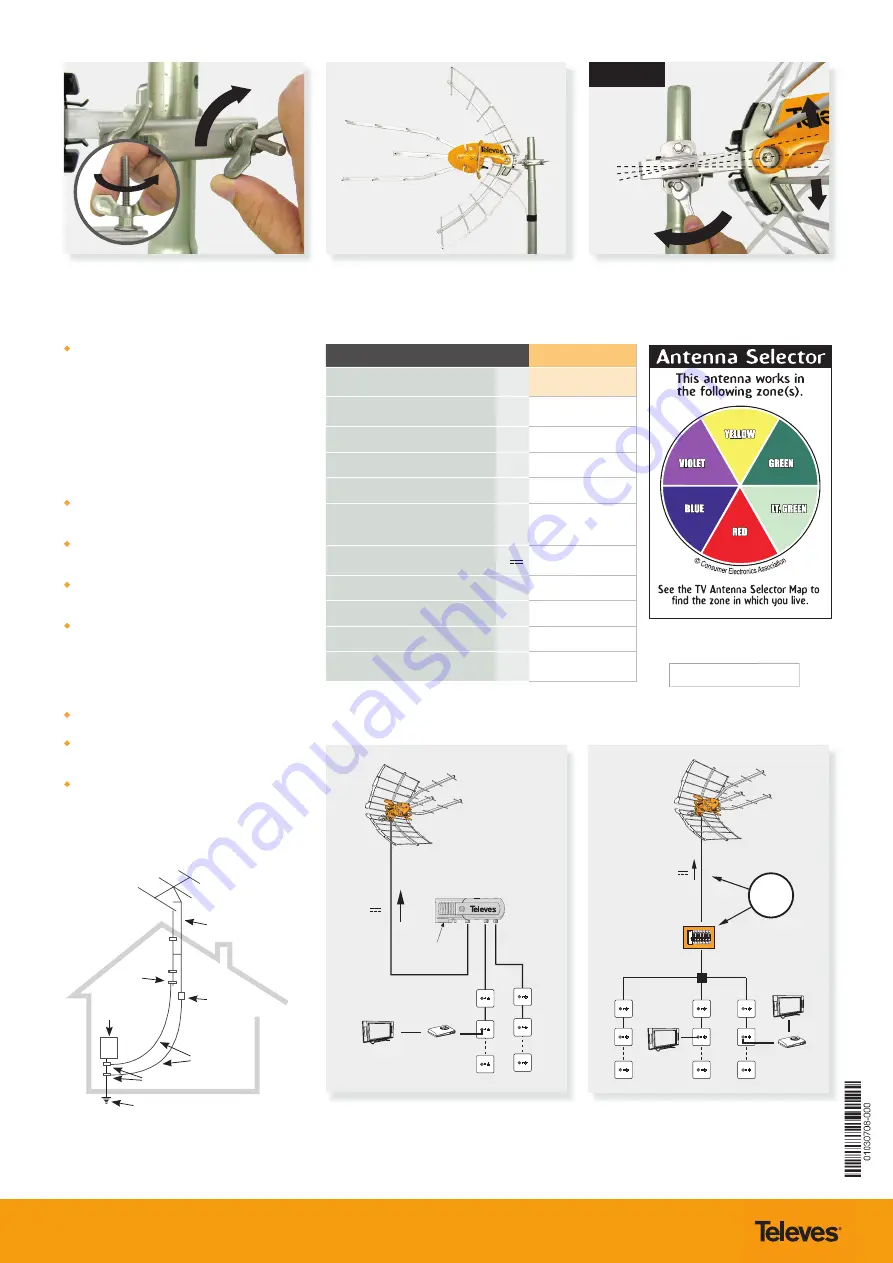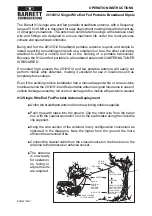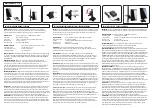
2018 © Copyright, Televés S.A.
Technical specifications of the intelligent antenna (it must be powered)
Características técnicas de la antena inteligente (debe estar alimentada)
Ref.
Ref.
148920
Working band
Banda de trabajo
MHz
470 - 698
(CH14 - CH51)
Mode
Modo
INTELLIGENT
(BOSS ON)
Gain
Ganancia
dBi
38 ±2
Output level
Nivel de salida
Auto
(1)
Noise figure
Figura de ruido
dB
2,5 (typ)
Signal level
of use
(recommend.)
Nivel de señal
de uso
(recomend.)
dBμV
< 75
Powering
voltage
Tensión de
alimentación
V
12-24
Consumpt.
Consumo
mA
40 (max)
Beamwidth
Ancho de haz
º
30
F/B ratio
Relación D/A
dB
>20
Wind load
Carga al viento
N
96 (@ 80 mph)
132 (@ 93 mph)
(1)
- The gain is automatically adjusted according to the output level.
- La ganancia varía automáticamente en función del nivel de salida.
Optional
EN - Hereby, Televés S.A. declares that the radio equipment type ELLIPSE is in compliance with Directive 2014/53/EU. The full text of the
EU declaration of conformity is available at the following internet address: https://doc.televes.com.
ES - Por la presente, Televés S.A. declara que el tipo de equipo radioeléctrico ELLIPSE es conforme con la Directiva 2014/53/UE. El texto
completo de la declaración UE de conformidad está disponible en la dirección Internet siguiente: https://doc.televes.com.
ellipse.televes.com
Televes USA LLC.
1385 S Colorado Blvd, Suite A-108 Denver, CO 80222 (USA) televes.usa@televes.com www.televes.com
Safety Instructions:
LIGHTNING PROTECTION
If installed outdoors, be sure the antenna system is
grounded so as to provide protection against voltage
surges and built-up static charges. Section 810 of the
National Electrical Code ANSI/NFPA70, or CSA C22.1
sections 10, 16, and 54, of the Canadian Electrical Code,
provide information with respect to proper grounding
of the mast and supporting structure, grounding of
the antenna lead-in wire to an antenna discharge unit,
size of grounding conductors, location of antenna-
discharge unit, connection to grounding electrodes, and
requirements for the grounding electrode (see figure
and instructions).
Mount the lightning arrestor or 75 ohm coaxial
grounding block as close as possible to where the 75
ohm coaxial cable downlead enters the house.
The ground wires for both the mast and the downlead
should be copper or aluminum wire, number eight (8)
or larger.
The downlead wire from the antenna to the lightning
arrestor and the mast ground wire should be secured to
the house, spaced from four (4) to six (6) feet apart.
In the case of a “ground up” antenna installation it may
not be necessary to ground the mast if the mast extends
four or more feet in the earth. Consult a TV serviceman
for the proper depth in your location.
WARNINGS
To prevent fire or shock hazard, do not expose the
included power supply to rain or moisture.
Installation of off-air antennas near power lines is
dangerous. For your safety, follow the installation
instructions.
Any alteration or modification to the product or usage
not in accordance with product instructions voids the
warranty.
Antenna Lead
in Wire
Example of antenna grounding as per
National Electrical Code, ANSI/NFPA 70
NEC - National Electrical Code
Ground
clamp
Electric Service
Equipment
Ground clamps
Power service Grounding Electrode System
(NEC Art 250, Part H)
Antenna Discharge Unit
(NEC Section 810-20)
(May substitute a 75 ohm
Coax Grounding Block)
Grounding Conductors
(NEC Section 810-21)




















